HaMidgam/former Dialog conducted a poll of 646 people that was published by Walla on Oct 2 2016.
How would you grade living in Israel?
56% Good, 40% Average, 3% Bad, 1% Very bad
Have you ever thought about leaving Israel?
77% No, 23% Yes
Note: Only 13% of Arabs said yes.
When do you think Israel will reach a peace deal with the Palestinians?
64% Never, 24% Not in next five years, 8% Don’t know, 4% Within the next five years
Israel’s biggest issue is?
36% Cost of living, 24% Security situation, 17% Corruption in public sector, 13% Housing, 9% Religion and State Issues
Do the following figures do their job well from a scale of 1-10 with 10 being highest and 1 being lowest?
Top 10: 6.71 Health Minister Litzman, 6.7 IDF COS Eizenkott, 6.2 President Rivlin, 5.9 Justice Minister Shaked, 5.8 Police Commish Alsheikh, 5.7 Education Minister Bennett, 5.4 Finance Minister Kahlon, 5.3 Culture and Sport Minister Regev, 5.3 Prime Minister Netanyahu, 5.2 Defense Minister Liberman
Note: Among Arabs: 7.7 Tibi and 7.1 Odeh


Sentiments were similar on German reunification right before it happened.
Jeremy, could you explain why Israel has all these one-man parties? Why don’t Kulanu and Yesh Atid work together? Why don’t Jewish Strength and Feiglin work with Bayit Yehudi? It makes no sense. Are there any reforms that could fix this? Maybe half the seats should be constituency based.
Israel tied an all-time low of 10 lists that were elected for the 20th Knesset. This is as a result of the electoral threshold increase to 3.25% that was passed in the last term.
The reform was meant to lower the number of lists, but it didn’t lower the number of parties. The Joint List is a joint list of four parties – Hadash, Ra’am, Balad and Ta’al. The Zionist Union is a joint ticket of Labor and Livni’s Party. Bayit Yehudi is a joint ticket between Bayit Yehudi and Tekuma. UTJ is a joint ticket of Agudat Yisrael and Degel HaTorah.
Previous reforms that increased the threshold led to eventual mergers of parties such as Likud, Labor and Meretz, but today there is very little incentive for a party to merge.
Jewish Strength/Strong Israel officially split off from Bayit Yehudi in 2012 in a Knesset House Committee vote. Feiglin officially left Likud in 2015 after falling down to the late 30s in the primaries and chose to register his own party over joining an existing one. Kulanu is led by Moshe Kahlon who was a former Likud Minister and most of his list are former Likud card carrying members – compared to zero in Yesh Atid.
The reason it can make sense to split is if you see you can gain from it in the polls. Lists that split without a good reason based on polls usually fall under the threshold. People have a better shot at a top cabinet position if they split and create their own party.
I have to run, but I’ll address the other stuff later.
A majority of Israelis chose lists that were not chosen by the primary system. In fact only three lists – Likud, Zionist Union and Bayit Yehudi – featured MKs that were chosen in the primary system. Most parties are chosen by one-person like Lapid, Kahlon, Liberman and Livni. Other parties have Central Committee selections such as Meretz or Tekuma.
Israelis care more about the head of the list and less about the party itself. Constituency based districts could actually create more lists because there would be less of a need for joint tickets. The Israel of old that was based on political parties is less relevant today.